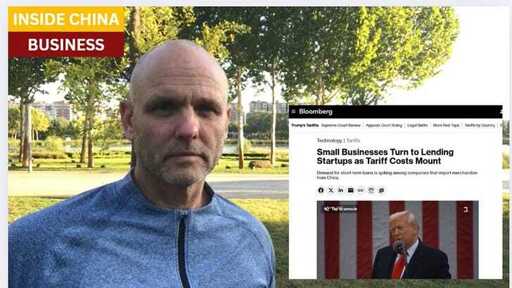Thanks for reading Inside China / Business! Subscribe for free to receive new posts and support my work.
Bullets:
Companies importing products into the United States must pay high tariffs and customs fees, immediately upon arrival.
These costs strain the cash flows of small- and medium-sized companies, and have scrambled trade finance.
Companies commonly use bank credit lines to build inventories, and pay down those lines as the products sell. But now they must pay large sums up-front, simply to get their goods out of customs warehouses.
A new industry has sprung up, making high-interest rate loans to cover the tariffs.
And business is booming, as tens of thousands of companies face little choice but pay high interest charges to avoid heavy fines, or having their cargoes seized for late payment.
This is a transcript, for the video found here:
Report:
Good morning.
The high tariffs are causing big problems for US companies importing products from abroad. So a new industry has formed to make high-interest rate loans to cover the costs of the tariffs. And it’s booming.
Small businesses are getting hit especially hard, and they’re borrowing to pay the tariffs and avoid having their imports seized by customs officials. Slope is a startup that has received funding from JP Morgan Chase, among others, and new applications for credit lines from Slope are up over 8 times this year. Once it became obvious to importers that the high tariffs from China are here to stay, companies don’t have a lot of good choices to pay the customs fees.
Slope is just four years old, and already has backing from big Silicon Valley investors. Sam Altman and a group of others kicked in $30 million in 2022. Last year JP Morgan Chase put in another $65 million in debt and equity. Slope didn’t even need the extra funds at that point, but JP Morgan has an enormous client base of small and medium-sized businesses, and lots of those need new sources of capital to pay the new high tariffs.
Slope can approve credit lines of $250,000 right away, and in two days can approve $3 million. Another firm in this space, Wayflyer, is also seeing a boom, with new applications in July up 28% in a single month. Clearco is another lender who lent 46% more this summer compared to last.
The new tariff policies are creating “volatility and uncertainty”, so companies are desperate to shore up liquidity in case they need it in a hurry.
Here is how operating loans typically work, for companies borrowing to acquire merchandise and inventory. We’ll draw down the line, then pay at back as the products sell. But the high tariffs scramble that schedule—companies have to pay the customs fees before the products are sold, just a couple of days after arrival. So these lenders can charge much higher rates—annual percentage rates on these loans are 20% or more, but importers don’t have much choice. Failure to pay the tariffs on time means high penalties, or seizures of the goods.
Here are some real-life examples of how it’s working. One of Slope’s customers needed a new credit line to pay $300,000 in tariffs when their large shipment arrived from China. They borrow at 1.5% per month, which is over 19% annualized. Another company that imports sporting goods and household products needed a bridge loan between paying the Chinese factory and his customers in the United States. The company has already raised prices, 15%-20%, so they hope to get it back upon sale, but they need financing to get it into stores and on Amazon.
Another brand, Obvi, needed the money to stock inventory for next year. Their manufacturing costs are already higher by 12%. But the uncertainty is a problem for them too. CEO says it’s weird he needs new credit lines, just because nobody knows what the rules are going to be, day-to-day.
Will Chau is an importer from California, and the tariffs put him out of business for electronics and generators, so he’s trying now to import modular homes from Canada for sale in California. He’s working twice as hard just to stay alive, lots of companies are going out of business.
Not private equity firms or big Wall Street banks, though. Somehow they always make money.
Resources and links:
Bloomberg, Small US Importers Are Scrambling to Cover Tariff Costs
Bloomberg, Small Businesses Turn to Lending Startups as Tariff Costs Mount
https://www.slopepay.com/bill-pay-financing
ForbesUnder 30 Startup Slope Scores A $65 Million Investment From One Of The World’s Biggest Banks
Thanks for reading Inside China / Business! Subscribe for free to receive new posts and support my work.
From Inside China / Business via this RSS feed
Wow, so it’s even more of a racket than I thought! They must pay tariffs, or they pay fines for not paying fast enough a’d taking up space at the docks? Is that it? What a wonderful business model.
Will Chau is an importer from California, and the tariffs put him out of business for electronics and generators, so he’s trying now to import modular homes from Canada for sale in California. He’s working twice as hard just to stay alive, lots of companies are going out of business. Not private equity firms or big Wall Street banks, though. Somehow they always make money.
SURPRISE 🫢


